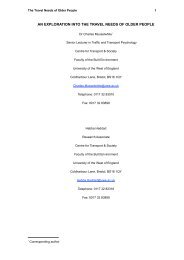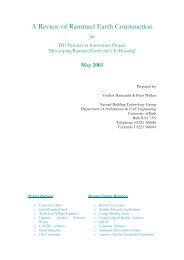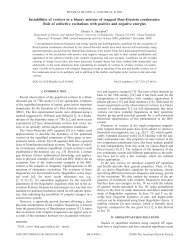Contents - Student subdomain for University of Bath
Contents - Student subdomain for University of Bath
Contents - Student subdomain for University of Bath
Create successful ePaper yourself
Turn your PDF publications into a flip-book with our unique Google optimized e-Paper software.
110 CHAPTER 3. POLYNOMIAL EQUATIONS<br />
3.5.6 Complexity<br />
Let us suppose that there are s polynomials involved in the input <strong>for</strong>mula (3.54),<br />
<strong>of</strong> maximal degree d. ( Then such a cylindrical algebraic decomposition can be<br />
computed in time O (sd) 2O(k))) .<br />
There are examples [BD07, DH88], which shows that this behaviour is bestpossible,<br />
indeed the projection onto R 1 might have a number <strong>of</strong> components<br />
doubly-exponential in k.<br />
While this behaviour is intrinsic to cylindrical algebraic decomposition, it is<br />
not necessarily intrinsic to quantifier elimination as such. If a is the number <strong>of</strong><br />
alternations <strong>of</strong> quantifiers (Notation 17) in the problem (so a < k), then there<br />
are algorithms [Bas99, <strong>for</strong> example] whose ( behaviour is singly-exponential in k<br />
but doubly-exponential in a; typically O (sd) O(k2 )2 O(a))) .<br />
One particular special case is that <strong>of</strong> no alternations. Hence, using the<br />
fact that ∃x (P (x) ∨ Q(x)) is equivalent to (∃xP (x)) ∨ (∃xQ(x)), an existential<br />
problem is equivalent to a set 27 <strong>of</strong> problems <strong>of</strong> the <strong>for</strong>m<br />
⎛<br />
⎞ ⎛<br />
⎞<br />
∃x ⎝ ∧<br />
f i (x) ≥ 0⎠ ∧ ⎝ ∧<br />
( )<br />
∧<br />
g i (x) = 0⎠ ∧ h i (x) ≠ 0 . (3.65)<br />
f i∈F<br />
g i∈G<br />
h i∈H<br />
This is generally referred to as the existential theory <strong>of</strong> the reals. Since the<br />
truth <strong>of</strong> a universal problem is equivalent to the falsity <strong>of</strong> an existential problem<br />
(∀xP (x) ⇔ ¬∃x¬P (x)), this is all we need to consider.<br />
Given a problem (3.65), cylindrical algebaric decomposition will yield such<br />
an x, if one exists, and failure to yield one is a pro<strong>of</strong> that no such x exists.<br />
However, this is a somewhat unsatisfactory state <strong>of</strong> affairs in practice, since,<br />
computationally, we are relying not just on the correctness <strong>of</strong> the theory <strong>of</strong><br />
cylindrical algebraic decomposition, but also on the absence <strong>of</strong> bugs in the implementation.<br />
An alternative is provided by the Positivstellensatz approach [Ste74].<br />
Theorem 26 ([PQR09, Theorem 3]) The set <strong>of</strong> solutions to (3.65) is empty<br />
if, and only if, there are:<br />
s ∈ con(F ) where con(F ), the cone <strong>of</strong> F , is the smallest set generated by F and<br />
the set <strong>of</strong> squares <strong>of</strong> all elements <strong>of</strong> R[x] wich is closed under multiplication<br />
and addition;<br />
g ∈ (G) the ideal generated by G;<br />
m ∈ mon(H) where mon(H), the (multiplicative) monoid <strong>of</strong> H is the set <strong>of</strong> all<br />
products (inding 1 = the empty product) <strong>of</strong> elements <strong>of</strong> H;<br />
such that s + g + m 2 = 0. Furthermore, there is an algorithm to find such s, g<br />
and m (if they exist) in Q[x] provided F , G and H ⊂ Q[x].<br />
27 There may be singly-exponential blow-up here as we convert into disjunctive normal <strong>for</strong>m,<br />
but this is small compared to the other exponential issues in play!



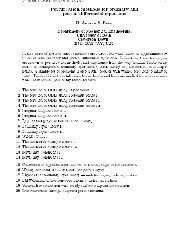
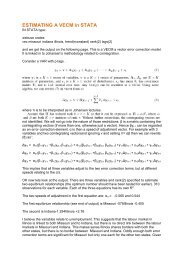

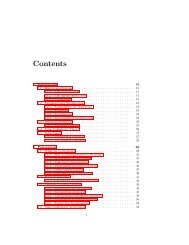
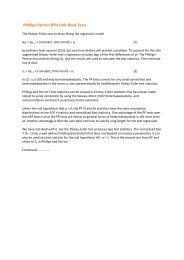
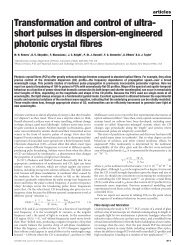
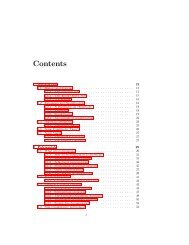

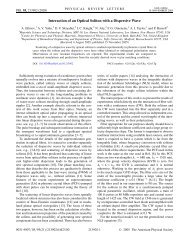
![[Luyben] Process Mod.. - Student subdomain for University of Bath](https://img.yumpu.com/26471077/1/171x260/luyben-process-mod-student-subdomain-for-university-of-bath.jpg?quality=85)

